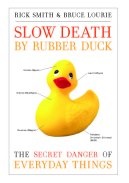I am out of town and literally just got out of the shower…
While I was showering I looked over at the plastic shower curtain and thought to myself, I wonder how many chemicals are being released while I shower? Then I decided that I needed to repost this story about chemicals.
We need to become more aware of the chemicals that are ever present in the things that we buy, use to clean, put on our bodies and are in the places that we live and work; and unfortunately also in hotels. This book is a great place to start or just searching the web.
But we need to know! Take the time to learn more to protect yourself and your family. What the government is not doing to protect us we must do for ourselves.
 Slow Death By Rubber Duck-the Secret Danger of Everyday Things, is a book about the prevalence of chemicals in our everyday lives. Chemicals that are found in our cosmetics, furniture, food and bedding and that remain in our bodies contributing to so many types of illness from cancer to birth defects. But what makes this book different is that the authors became human guinea pigs to really see the effects of chemicals in our everyday lives. If you are interested in buying a copy here is a link that will take you to your nearest Independent book store.
Slow Death By Rubber Duck-the Secret Danger of Everyday Things, is a book about the prevalence of chemicals in our everyday lives. Chemicals that are found in our cosmetics, furniture, food and bedding and that remain in our bodies contributing to so many types of illness from cancer to birth defects. But what makes this book different is that the authors became human guinea pigs to really see the effects of chemicals in our everyday lives. If you are interested in buying a copy here is a link that will take you to your nearest Independent book store.
The authors spent weeks in an apartment where the carpet and furniture had just been treated with a stain-resistant coating. They ate meals microwaved in plastic, drank coffee in polycarbonated cups. After two days of intensive use of personal care products the amount of triclosan, which prevents bacteria from growing in cosmetics, shot up nearly 3,000 times. The book chronicles their ‘experiments’ on themselves and the effects.
Written by Rick Smith and Bruce Lourie both of whom have a history with Environmental Defence, a Canadian organization dedicated to protecting the environment and human health. Rick Smith is the Executive Director and Bruce Lourie was a past president so they have been on the front lines researching solutions and going to court when needed to protect clean air, water and maintaining thriving ecosystems.
The authors hope that politicians will impose stricter rules on labeling but in the meantime they are hoping to inform the public how to protect themselves and easily cut down on chemical exposure. There are so many chemicals in our food, packaging, personal care and cleaning products, as well as in our furniture and all through our homes that we did not come into contact with until the last decades. It is only with knowledge that we can stop being poisoned with chemicals that need not be in most of these products and there are alternatives.